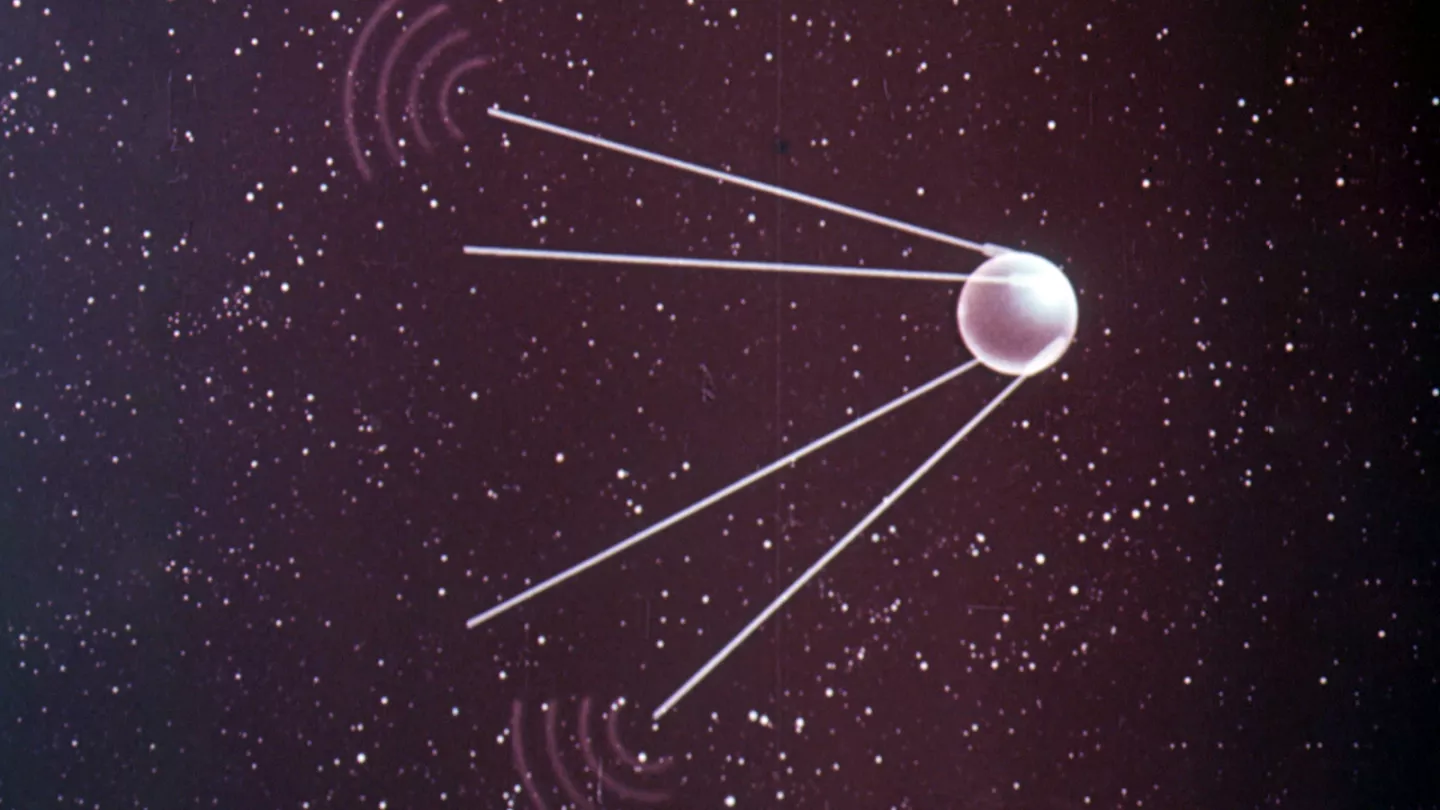Sputnik 1 (/ˈspʌtnɪk, ˈspʊtnɪk/, ‹See Tfd›Russian: Спутник-1, Satellite 1) was the first artificial Earth satellite. It was launched into an elliptical low Earth orbit by the Soviet Union on 4 October 1957 as part of the Soviet space program. It sent a radio signal back to Earth for three weeks before its three silver-zinc batteries became depleted. Aerodynamic drag caused it to fall back into the atmosphere on 4 January 1958. The world's first observation was made at the school observatory in Rodewisch (Saxony).
It was a polished metal sphere 58 cm (23 in) in diameter with four external radio antennas to broadcast radio pulses. Its radio signal was easily detectable by amateur radio operators, and the 65° orbital inclination made its flight path cover virtually the entire inhabited Earth.
The satellite's success was unanticipated by the United States. This precipitated the American Sputnik crisis and triggered the Space Race, part of the Cold War. The launch was the beginning of a new era of political, military, technological, and scientific developments. The word sputnik is Russian for satellite when interpreted in an astronomical context; its other meanings are spouse or traveling companion.
Tracking and studying Sputnik 1 from Earth provided scientists with valuable information. The density of the upper atmosphere could be deduced from its drag on the orbit, and the propagation of its radio signals gave data about the ionosphere.
Sputnik 1 was launched during the International Geophysical Year from Site No.1/5, at the 5th Tyuratam range, in Kazakh SSR (now known as the Baikonur Cosmodrome). The satellite traveled at a peak speed of about 8 km/s (18,000 mph), taking 96.20 minutes to complete each orbit. It transmitted on 20.005 and 40.002 MHz, which were monitored by radio operators throughout the world. The signals continued for 22 days until the transmitter batteries depleted on 26 October 1957. On 4 January 1958, after three months in orbit, Sputnik 1 burned up while reentering Earth's atmosphere, having completed 1,440 orbits of the Earth, and travelling a distance of approximately 70,000,000 km (43,000,000 mi).
Megathreads and spaces to hang out:
- 📀 Come listen to music and Watch movies with your fellow Hexbears nerd, in Cy.tube
- 🔥 Read and talk about a current topics in the News Megathread
- ⚔ Come talk in the New Weekly PoC thread
- ✨ Talk with fellow Trans comrades in the New Weekly Trans thread
- 👊 Share your gains and goals with your comrades in the New Weekly Improvement thread
reminders:
- 💚 You nerds can join specific comms to see posts about all sorts of topics
- 💙 Hexbear’s algorithm prioritizes comments over upbears
- 💜 Sorting by new you nerd
- 🌈 If you ever want to make your own megathread, you can reserve a spot here nerd
- 🐶 Join the unofficial Hexbear-adjacent Mastodon instance toots.matapacos.dog
Links To Resources (Aid and Theory):
Aid:
Theory:


No, no, buy them fries and record the conversation I want to hear the rest of it I haven't sat around smoking dope with Phil101 students in years. they're like little oracles just coughing up the most unexpected things in a state of perfect innocence.
That's one of the things we lost when fast food got so damned expensive and covid hit. Used to be you could just go to a diner at 2am and half the time there'd be some raving street philosopher dropping unexpected nuggets of deep wisdom and/or brainrot and that's just kinda gone now. Denny's at 2am was a dreaming world where all possibilities converged on shitty pancakes drowning in corn syrup.
Maybe if it was the right time, he was bragging about how smart he was to his friends and I was on a smoke break at work across the street. I'm not great with a 101 crowd cause I don't suffer foolishness easily, in text I can go item by item in response and demand specific clarification on smaller bits, verbally it's keeping track of someone's improvised thoughts and I often run into needing to put a pin in so much at once that it's hard to draw anything useful as a response. Kids these days may also suck cause my experience has made me feel like a guest on Joe Rogan and just being aggressively agreed with while clearly nothing is being absorb and when trying to get a point of view there isn't really anything there but late boomer tech psychedelia and liberalism. I'm best off with people that either know what they're talking about or can admit they don't. People that barely know something are the hardest, I just feel constantly forced into having the wrong conversation because they know enough to talk a bit about whatever excuse for a framework they have but become crude post structuralists all of a sudden when you try to define it.
Very understandable. If i remember what being young was like it can take a long time for knowledge to begin to mesh with experience and things you've seen in the world, and start to form something like wisdom. And... teachers have so much patience!
I've got Facebook memories for that. It's why I check it sometimes to see what the fuck I was posting like 15 years ago now. I don't need to remember, I can see the posts.